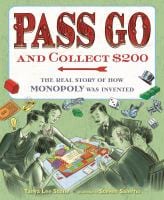The Landlord’s Game or Monopoly
Monopoly = The exclusive possession or control of the supply or trade of a commodity or service. (Scott Nearing)
 Pass Go and Collect $200: The Real Story of How Monopoly Was Invented (Henry Holt) by Tanya Lee Stone, illustrated by Steven Salerno
Pass Go and Collect $200: The Real Story of How Monopoly Was Invented (Henry Holt) by Tanya Lee Stone, illustrated by Steven Salerno
Families have played the board game, Monopoly, for over 80 years. One might assume that there was a single inventor who came up with the idea for the game. However, the development and history of this popular amusement are tangled up in a number of ways.
In 1904, a progressive woman, Lizzie Magie, received a patent for the Landlord’s Game. She had developed this competitive board game mainly for adults and children, and her purpose was to demonstrate the unfairness between landlords and tenants. Many of the details of Monopoly, as we know it, were part of her game – four railroads, properties with sale and rental prices, and jail. Lizzie had a number of her game boards manufactured and sold. When she approached the Parker Brothers game company to purchase, manufacture, and sell the Landlord’s Game, they turned her down. Lizzie was savvy enough to renew her patent on the game in future years.
Scott Nearing bought one of Lizzie’s game boards and brought it to the students in his business classes at the University of Pennsylvania. He used it as a way to teach about ownership, and Nearing and his students began to call it Monopoly. Students from his class began making their own copies of the game board to play outside of class…and their friends made copies…and their friends made copies.
One teacher, Ruth Haskins, and her friends added the names of properties in their neighborhood to their homemade board. Their properties represented Atlantic City – St. Charles Place, Ventnor Avenue, and Boardwalk.
During the Great Depression, Charles Darrow played the game of Monopoly at a friend’s house and borrowed the board to make his own. He, too, made his own changes and created stencils for the Chance question marks, the Water Works faucet, the Electric Company light bulb, and the railroad trains. Charles found a market for his newly improved game when a major department store sold many during one Christmas season. Even though the Parker Brothers had also turned Darrow down, this success changed their minds. However, even though the game had been changed, the Parker Brothers recognized it as being a version of Lizzie Magie’s original idea. They bought the rights from her for $500 in 1935. Charles Darrow was listed as the inventor of Monopoly when the game was manufactured.
The Washington Post published an interesting article about the origins of the game.